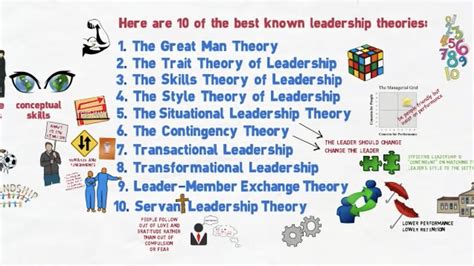Effective leadership is the cornerstone of any successful organization. Without skilled leaders, teams can lack direction, motivation, and cohesion, ultimately leading to decreased productivity and performance. In today's fast-paced and ever-changing business landscape, leaders must be equipped with the skills and knowledge necessary to drive their teams forward and stay ahead of the competition. Leadership theory provides a framework for understanding the complex dynamics of leadership and offers practical guidance on how to develop the skills required for success.
The Importance of Leadership Theory
Leadership theory is not just a collection of abstract concepts; it is a powerful tool that can help leaders make informed decisions, navigate complex challenges, and inspire their teams to achieve exceptional results. By understanding the different leadership theories and models, leaders can develop a more nuanced understanding of their own strengths and weaknesses, as well as those of their team members. This self-awareness is essential for effective leadership, as it enables leaders to adapt their approach to suit different situations and individuals.

Key Leadership Theories
There are many different leadership theories, each with its own unique perspective on what makes a effective leader. Some of the most influential leadership theories include:
- Transformational Leadership Theory: This theory, developed by James MacGregor Burns, suggests that leaders should focus on inspiring and motivating their teams to achieve a shared vision. Transformational leaders are charismatic, visionary, and able to empower their team members to take ownership of their work.
- Servant Leadership Theory: This theory, developed by Robert K. Greenleaf, emphasizes the importance of leaders serving their teams, rather than the other way around. Servant leaders prioritize the needs of their team members and focus on creating a positive, supportive work environment.
- Situational Leadership Theory: This theory, developed by Paul Hersey and Ken Blanchard, suggests that leaders should adapt their approach to suit different situations and team members. Situational leaders are able to adjust their leadership style to meet the needs of their team, whether that involves providing guidance, support, or autonomy.
Developing Leadership Skills
While leadership theory provides a valuable framework for understanding the complexities of leadership, it is only the first step in developing the skills required for success. To become an effective leader, individuals must be willing to learn, grow, and develop their skills through practice and experience.
Some key leadership skills include:
- Communication: The ability to communicate clearly, concisely, and persuasively is essential for effective leadership. Leaders must be able to articulate their vision, provide feedback, and listen actively to their team members.
- Emotional Intelligence: Emotional intelligence refers to the ability to recognize and understand emotions in oneself and others. Leaders with high emotional intelligence are able to empathize with their team members, manage conflict, and build strong relationships.
- Strategic Thinking: Leaders must be able to think strategically, making informed decisions that align with the organization's goals and objectives. This involves analyzing complex data, identifying trends and patterns, and developing creative solutions to problems.

Putting Leadership Theory into Practice
While leadership theory provides a valuable framework for understanding the complexities of leadership, it is only by putting these concepts into practice that individuals can develop the skills required for success. Here are some practical tips for applying leadership theory in real-world situations:
- Seek Feedback: Leaders should seek feedback from their team members, peers, and mentors to gain a deeper understanding of their strengths and weaknesses.
- Practice Self-Reflection: Leaders should regularly reflect on their own behavior, decisions, and outcomes to identify areas for improvement.
- Develop a Growth Mindset: Leaders should be willing to learn, grow, and develop their skills through practice and experience.
- Empower Others: Leaders should prioritize empowering their team members, providing them with the autonomy, support, and resources necessary to achieve exceptional results.
Gallery of Leadership in Action





Frequently Asked Questions
What is leadership theory?
+Leadership theory refers to the study of leadership and the various frameworks, models, and concepts that are used to understand and explain leadership behavior.
Why is leadership theory important?
+Leadership theory is important because it provides a framework for understanding the complex dynamics of leadership and offers practical guidance on how to develop the skills required for success.
What are some key leadership skills?
+Some key leadership skills include communication, emotional intelligence, strategic thinking, and the ability to empower others.
By understanding leadership theory and developing the skills required for success, individuals can become effective leaders who inspire and motivate their teams to achieve exceptional results. Whether you are a seasoned leader or just starting out, leadership theory provides a valuable framework for navigating the complex challenges of leadership and achieving success in today's fast-paced and ever-changing business landscape.
